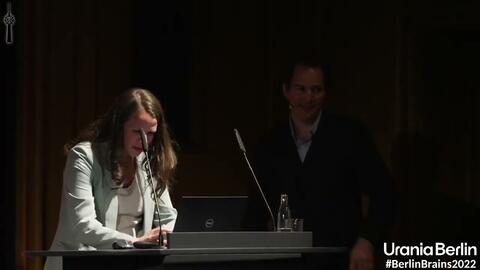
Berlin Brains
These are the lectures by researchers from the Max Delbrück Center:
Sex and Gender in Mental Health: Why Sex Matters

More and more people are suffering from stress and depression. To effectively help them, studies using animal models are indispensable. But how can mental health be studied in animals? And what influence does sex have on the course of the illness and its treatment?
Hanna Hörnberg and Tobias Pohl provide insights into the biology of the psyche. Their research illustrates how significantly sex can impact mental health and well-being, and what new therapeutic options might result from it.
Die heimlichen Helfer des Gehirns

Microglia are the immune cells of the brain. For a long time, they were not associated with psychiatric illnesses. PD Dr. Susanne Wolf and Prof. Dr. Josef Priller are investigating the role that the smallest cells of the nervous system play in changes in perception and behavior - for example in schizophrenia or autism. You will also find out more about the latest research findings and how they can be used in clinical practice.
Let's take a cold hard look at how the brain represents temperature

It feels very natural to touch an object and immediately identify whether it is warm or cold. But how does this actually work? As natural as sensing temperature may seem to us, we still don’t know how and where the brain makes sense of temperature information. Jean-Sébastien Jouhanneau and Clarissa Whitmire explain in their talk how the brain processes sensory information to generate a perception of the outside world and what their results mean for all of us.
Missglücktes Eiweiß Origami

The common feature of nerve diseases such as Alzheimer's, Parkinson's or Huntington's is damaged nerve cells due to deposited, misfolded proteins in the brain. Why is protein folding important, how does it happen, and why do misfolded proteins damage cells? Prof. Erich Wanker and Dr. Anne Ast are investigating these questions. Using the example of Huntington's disease, they show how misfolded protein molecules increasingly clump together and thus slowly cause nerve cells to die. And they report on new approaches to dissolve the protein clumps in order to alleviate the disease.
Gefahr fürs Gehirn – Den Ursachen von Alzheimer auf der Spur

Prof. Thomas Willnow and Dr. Anna Löwa talk about the causes of Alzheimer's disease and experiments with mice and brain organoids.
Berlin Brains is a collaboration between Charité – Universitätsmedizin Berlin and Urania Berlin. The lecture series is jointly presented by:
- Einstein Center for Neurosciences Berlin (ECN)
- NeuroCure Cluster of Excellence
- Max Delbrück Center
- Collaborative Research Center 1315 (SFB1315)
- Center for Stroke Research Berlin (CSB)
- Bernstein Center for Computational Neuroscience Berlin (BCCN Berlin)
